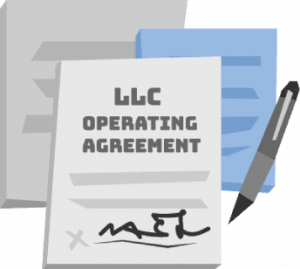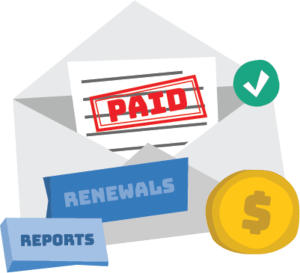How To Start An LLC In North Dakota
To form an LLC in North Dakota, you’ll need to follow three primary steps:
- Pick a business name
- Designate a registered agent
- File Articles of Organization ($135)
But to really prepare your business for success, you’ll want to do a few more things, like get a domain name, EIN, and prepare for annual report filings. We’ll take you through everything you need to know for your company’s registration and beyond.

1. Name Your LLC
Naming your LLC should be fun, but the name you choose must meet the expectations of ND Cent. Code § 10-32.1-11. Basically, your LLC name must:
- Contain limited liability company, limited company, or the abbreviation L.L.C., LLC, L.C., or LC.
- Not include words or abbreviations that make it sound like the LLC is another kind of entity, like corp or limited partnership.
- Be distinguishable (unique) among approved business names in North Dakota.
If you’ve got a great business name but you’re not ready to form your business, you can put a hold on the name by filing a Reserved Name Application through North Dakota’s FirstStop online filing system.
Already have a business name? Check to see if it’s available.
Businesses often want to operate under a name that is different than the legal name they file under. If you would like to use a name other than the name that appears on your articles of organization, you’ll need to file what’s called a “Doing Business As” or DBA.
The North Dakota Secretary of State charges a $25 fee for a new DBA or trade name. You can file online through the FirstStop online business portal, or fill out and print the Trade Name Registration or Franchise Name Disclosure form. Your DBA will be good for five years before you need to renew it.
Thinking about using a trade name? Learn How to Get a North Dakota DBA.
Start an LLC in North Dakota


2. Register Your Domain Name
After choosing your LLC’s name, a good next step is locking down a domain name for your business website. Your domain name (URL) is your site’s web address.
A professional domain name should be easy to remember—and ideally, match or complement your business name. When you register your domain name early, you’re more likely to get a name that meets those standards.
You’ll need to claim a business domain name through a registrar. When you hire Northwest to form your LLC, domain registry is one of many in-house services we provide, so you also get a domain name free for a year, plus your own customizable business website secured with SSL protection, and up to ten email business addresses connected to that domain.

3. Designate a Registered Agent
ND Cent. Code § 10-32.1-16 requires all LLCs operating in North dakota to have a registered agent. A registered agent receives service of process for your business. You can be your own registered agent or hire a person or professional company to act as your registered agent. Whatever you choose, you’ll need your registered agent’s name and address before you start working on your Articles of Organization.
Learn why the pros use a registered agent service.
Yes, you can be your own registered agent, but your business can not be your business’s registered agent. But ask yourself—will you be available during regular business hours? Are you organized and guaranteed not to misplace or lose important mail? Most of all, are you willing to put your name and address on state documents?
Yes. How you change your North Dakota registered agent depends on if you’re using a commercial registered agent or a noncommercial registered agent. A commercial registered agent is a business or individual that has registered with the Secretary of State to be the registered agent for a large number of companies. Noncommercial registered agents often deal with a smaller number of businesses and do not need to register with the state.

4. Submit North Articles of Organization
Now it’s time for you to fill out your Articles of Organization. Once filed, your Articles will officially form your LLC.
Provide the following information about your LLC in order to successfully fill out the Articles:
- LLC type: Select whether you’re forming a regular LLC or a Farming/Ranching LLC. Initial reports are required for Farming/Ranching LLCs.
- Company name: include an indicator like LLC
- Principal office: the street address of your LLC
- Registered agent: whoever will accept legal mail on behalf of the LLC
- Registered office: the street address where your registered agent will accept legal notifications
- Formation date: Want to delay your start? You can list a date up to 60 days in the future.
- Existence: Skip this box if you want your LLC to continue existing indefinitely.
- Business purpose: Most LLCs put a general purpose like for any lawful purpose. You don’t need to spill your guts here.
- Organizer: the person who completes and submits your Articles
Note: All of the information on this form will become part of the public record.
The filing fee for $135. You can pay by check or credit card.
This is the important part. Filing your North Dakota Articles of Organization is what officially creates your LLC. You can file them online, by fax (really North Dakota, really?) or by mail.
Mail:
Secretary of State
Business Registration Unit
600 E. Boulevard Avenue Dept 108
Bismarck ND 58505-0500
Fax:
Send the documents and credit card authorization form to (701) 328-2292
Online filings:
North Dakota FirstStop
The key to keeping your information off public record is to hire a registered agent that will happily put their name and address on all of your state formation paperwork. That way, instead of you getting unnecessary robocalls and mailings, your registered agent’s office will deal with all that. We’re that registered agent!
What to Do After Creating Your North Dakota LLC

Write an Operating Agreement
Drawing up an operating agreement for your LLC is an important step because it outlines the LLC’s rules and regulations as well as its basic structure. The purpose of the operating agreement is to govern the internal operations of the LLC, bring legitimacy to your business, and create a framework in case disagreements between members arise.
Check out our attorney-drafted Operating Agreement.
North Dakota does not specifically require an operating agreement, but it is in your best interest to write one. An operating agreement is one of your LLC’s most important internal documents. Creating one can help your LLC with things like opening a bank account, keeping track of initial funding, and even handling the addition of members or the dissolution of the business.
Operating agreements are specific to each LLC, but you’ll definitely want to address:
- initial funding of the LLC
- distribution of profits and losses
- management and membership powers, duties, and voting rights
- member and manager compensation
- accounting responsibilities
- transfer of membership interest
- dissolution of the LLC
100% yes. Most banks want to see an LLC operating agreement before you open a business account. What’s more, an operating agreement serves to give your LLC more legitimacy and provides guidance in case you want to add members to the LLC.

Get an EIN, Bank Account & Funding
Interested in opening a bank account for your LLC? You’ll first need to get an EIN (Employer Identification Number). An EIN is a unique, 9-digit identification number that is assigned by the IRS. Not only does opening a business bank account create a more defined separation between your personal and business finances, but it also allows you to have a place to put the initial funds to start your LLC.
If you have more members in your LLC, each can make an initial contribution to the business bank account. To open a business bank account you’ll need to bring the following to the bank:
- Articles of Organization (you can use a copy)
- the LLC’s operating agreement
- the LLC’s EIN
- an LLC Resolution to Open a Bank Account (if your LLC has more than one member)
If your LLC has more than one member, use our free LLC Resolution to Open a Bank Account.
To get an EIN in North Dakota, you’ll file Form SS-4 with the IRS. You can file this form online if you have an SSN (social security number) or by mail using the paper form if you don’t have a social security number. There is no fee for this form.
Ready to Start an LLC in North Dakota?






